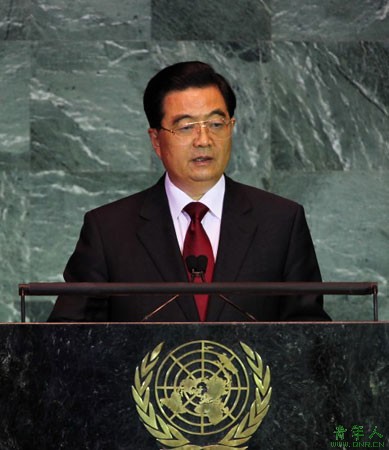
(音频为英文同传,与官方文件版本有出入)
潘基文秘书长,各位同事:
Secretary-General Ban Ki-moon, Dear Colleagues,
今天,各国领导人汇聚联合国,共商应对气候变化大计,这对推动国际社会有力应对气候变化这一全球性挑战具有十分重要的意义。
Today, world leaders are gathered at the United Nations to discuss ways to tackle climate change. This is of great significance for catalyzing strong action by the international community to meet this global challenge.
全球气候变化深刻影响着人类生存和发展,是各国共同面临的重大挑战。37年来,从斯德哥尔摩到里约热内卢,从京都到巴厘岛,我们为保护全球环境、应对气候变化共同努力,取得显著成就。这是世界各国不断加深认知、不断凝聚共识、不断应对挑战的历史进程。《联合国气候变化框架公约》及其《京都议定书》已成为各方公认的应对气候变化主渠道,共同但有区别的责任原则已成为各方加强合作的基础,走可持续发展道路、实现人与自然相和谐已成为各方共同追求的目标。
Global climate change has a profound impact on the existence and development of mankind, and is a major challenge facing all countries. In the last 37 years, from Stockholm to Rio de Janeiro, and from Kyoto to Bali, we have made concerted efforts and achieved notable progress in protecting the global environment and tackling climate change. This is a historic process, through which all countries have deepened their understanding, built consensus and stepped forward to meet the challenge. The United Nations Framework Convention on Climate Change (UNFCCC) and its Kyoto Protocol have now been universally recognized as the primary channel to address climate change. The principle of common but differentiated responsibilities has been established as the basis for closer international cooperation. And sustainable development and harmony between man and nature has become the common goal of all parties.
气候变化是人类发展进程中出现的问题,既受自然因素影响,也受人类活动影响,既是环境问题,更是发展问题,同各国发展阶段、生活方式、人口规模、资源禀赋以及国际产业分工等因素密切相关。归根到底,应对气候变化问题应该也只能在发展过程中推进,应该也只能靠共同发展来解决。
Climate change is an issue arising in the course of human development. It is associated with both natural factors and human activities. It is an environmental issue, but also, and more importantly, a development issue, as it is closely connected with the development stage, way of life, size of population and resource endowment of different countries and their places in the international division of labor. In the final analysis, we should and can only advance efforts to address climate change in the course of development and meet the challenge through common development.
应对气候变化,涉及全球共同利益,更关乎广大发展中国家发展利益和人民福祉。在应对气候变化过程中,必须充分考虑发展中国家的发展阶段和基本需求。发展中国家历史排放少、人均排放低,目前受发展水平所限,缺少资金和技术,缺乏应对气候变化能力和手段,在经济全球化进程中处于国际产业链低端,承担着大量转移排放。当前,发展中国家的首要任务仍是发展经济、消除贫困、改善民生。国际社会应该重视发展中国家特别是小岛屿国家、最不发达国家、内陆国家、非洲国家的困难处境,倾听发展中国家声音,尊重发展中国家诉求,把应对气候变化和促进发展中国家发展、提高发展中国家发展内在动力和可持续发展能力紧密结合起来。
At stake in the fight against climate change are the common interests of the entire world, and the development interests and people’s well-being of the vast number of developing nations in particular. It is imperative to give full consideration to the development stage and basic needs of developing countries in addressing climate change. Both their historical and per capita emissions are low. Due to their low development level and shortage of capital and technology, developing countries have limited capability and means to deal with climate change. And they have to bear a large amount of transferred emission as they are placed at the lower end of the international industrial chain in the process of economic globalization. For developing countries, the top priority now is to grow economy, eradicate poverty and improve livelihood. The international community should pay close attention to the predicament of developing countries, especially the small island states, the least developed countries, landlocked countries and African countries. It is important to listen to their voice and respect their wishes, and combine our efforts to address climate change with those to promote the growth of developing countries and build up their own dynamism for development and ability for sustainable development.
各位同事!
Dear Colleagues,
应对气候变化,实现可持续发展,是摆在我们面前一项紧迫而又长期的任务,事关人类生存环境和各国发展前途,需要各国进行不懈努力。当前,我们在共同应对气候变化方面应该坚持以下几点。
To address climate change and achieve sustainable development is an urgent and long-term task for all of us. It bears on the living environment of mankind and the development prospects of all countries, and calls for the unremitting efforts of the whole world. In this connection, let me highlight a few principles we need to follow in our common endeavor to tackle climate change:
第一,履行各自责任是核心。共同但有区别的责任原则凝聚了国际社会共识。坚持这一原则,对确保国际社会应对气候变化努力在正确轨道上前行至关重要。发达国家和发展中国家都应该积极采取行动应对气候变化。根据《联合国气候变化框架公约》及其《京都议定书》的要求,积极落实“巴厘路线图”谈判。发达国家应该完成《京都议定书》确定的减排任务,继续承担中期大幅量化减排指标,并为发展中国家应对气候变化提供支持。发展中国家应该根据本国国情,在发达国家资金和技术转让支持下,努力适应气候变化,尽可能减缓温室气体排放。
First, fulfilling respective responsibilities should be at the core of our effort. The principle of common but differentiated responsibilities embodies the consensus of the international community. Adherence to this principle is critical to keeping international cooperation on climate change on the right track. Both developed and developing countries should take active steps to tackle climate change. We should act in keeping with the provisions of the UNFCCC and its Kyoto Protocol and advance negotiations under the Bali Roadmap in real earnest. Developed countries should fulfill the task of emission reduction set in the Kyoto Protocol, continue to undertake substantial mid-term quantified emission reduction targets, and support developing countries in countering climate change. Developing countries should, in the light of their national conditions and with the financial and technological support of developed countries, work hard to adapt to climate change and do their best to reduce greenhouse gas emissions.
第二,实现互利共赢是目标。气候变化没有国界。任何国家都不可能独善其身。应对这一挑战,需要国际社会同舟共济、齐心协力。支持发展中国家应对气候变化,既是发达国家应尽的责任,也符合发达国家长远利益。我们应该树立帮助别人就是帮助自己的观念,努力实现发达国家和发展中国家双赢,实现各国利益和全人类利益共赢。
Second, achieving mutual benefit and win-win outcome should be the goal of our effort. Climate change respects no national borders, and no country is immune from it. To counter this challenge requires the whole-hearted cooperation and coordinated actions of the international community. Developed countries should support developing countries in tackling climate change. This is not only their responsibility, but also serves their long-term interest. We should foster the idea that helping others is helping oneself and make our endeavor on climate change a win-win for both developed and developing countries and a win-win for both the interests of individual countries and the common interests of humanity.
第三,促进共同发展是基础。发展中国家应该统筹协调经济增长、社会发展、环境保护,增强可持续发展能力,摆脱先污染、后治理的老路。同时,不能要求发展中国家承担超越发展阶段、应负责任、实际能力的义务。从长期看,没有各国共同发展,特别是没有发展中国家发展,应对气候变化就没有广泛而坚实的基础。
Third, promoting common development should be the basis of our effort. Developing countries need to strike a balance between economic growth, social development and environmental protection, strengthen capacity for sustainable development and avoid the old path of "polluting first and cleaning up later". They should not, however, be asked to take on obligations that go beyond their development stage, responsibility and capabilities. Without common development, particularly the development of developing countries, there cannot be a broad and solid basis in the long run for tackling climate change
责任编辑:sealion1986